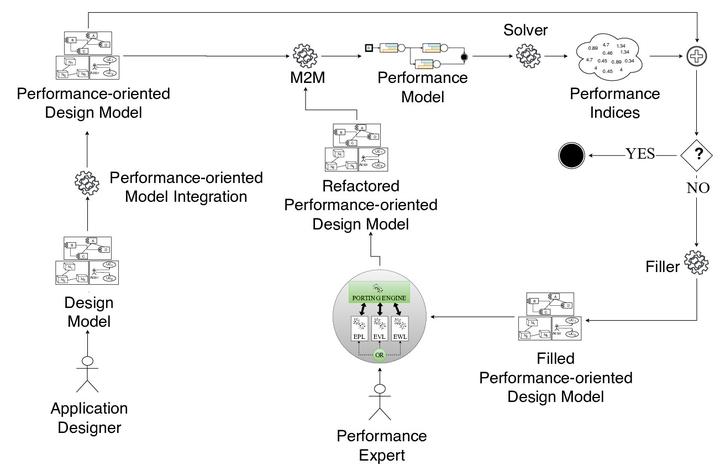 PADRE process
PADRE processAbstract
Context Software refactoring is a common practice aimed at addressing requirements or fixing bugs during the software development. While refactoring related to functional requirements has been widely studied in the last few years, non-functional-driven refactoring is still critical, mostly because non-functional characteristics of software are hard to assess and appropriate refactoring actions can be difficult to identify. In the context of performance, which is the focus of this paper, antipatterns represent effective instruments to tackle this issue, because they document common mistakes leading to performance problems as well as their solutions.
Objective In order to effectively reuse the knowledge beyond performance antipatterns, automation is required to detect and remove them. In this paper we introduce a framework that enables, in an unique tool context, the refactoring of software models driven by performance antipattern detection and removal.
Method We have implemented, within the EPSILON platform, detection rules and refactoring actions on UML models for a set of well-known performance antipatterns. By exploiting the EPSILON languages to check properties and apply refactoring on models, we enable three types of refactoring sessions.
Results We experiment our framework on a Botanical Garden Management System to show, on one side, that antipatterns can effectively drive software refactoring towards models that satisfy performance requirements and, on the other side, that the automation introduced by EPSILON-based sessions enables to inspect multiple paths and to propose a variety of solutions.
Conclusion This work demonstrates that automation in performance-driven software model refactoring can be beneficial, and that performance antipatterns can be powerful instruments in the hands of software engineers for detecting (and solving) performance problems usually hidden to traditional bottleneck analysis. This work also opens the road to the integration of well-known techniques for software refactoring driven by functional requirements with novel techniques addressing non-functional requirements like performance.